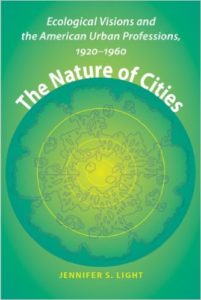“A fascinating and suggestive account of the influence of ecology and natural-resource management on academic urbanists, city planners, and real-estate professionals.” — Technology and Culture
Honorable Mention, 2009 Lewis Mumford Prize, Society for City and Regional Planning History
In the early twentieth century, America was transformed from a predominantly agricultural nation to one whose population resided mostly in cities. Yet rural areas continued to hold favored status in the country’s political life.
For prominent figures in the social sciences, city planning, and real estate who were anxious about the future of cities, this obsession with the agrarian past inspired a new campaign for urban reform. They called for ongoing programs of natural resource management to be extended to maintain and improve cities.
Jennifer S. Light finds a new understanding of the history of urban renewal in the United States in the rise and fall of the American conservation movement. The professionals Light examines came to view America’s urban landscapes as ecological communities requiring scientific management on par with forests and farms. The Nature of Cities brings together environmental and urban history to reveal how, over four decades, this ecological vision shaped the development of cities around the nation.
